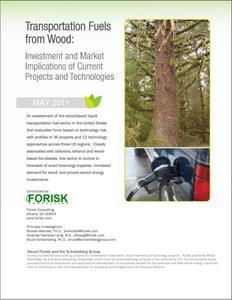Wood waste has been one of the feedstocks most studied for viability as a biofuel. Today a new study evaluates the promise of wood waste biofuels by reviewing 12 technologies and 36 projects that convert wood to fuels including ethanol, butanol, diesel, gasoline, and jet fuel. This particular area of research has garnered strong public and private investment and drop-in fuels projects even more so. Yet according to Forisk Consulting and the Schiamberg Group, the authors of the “Transportation Fuels from Wood: Investment and Market Implications of Current Projects and Technologies,” biofuels derived from wood waste will fail to substantively contribute to the Renewable Fuels Standard (RFS2) either this year or through 2022.
 According to co-author Dr. Bruce Schiamberg of the Schiamberg Group, major technical hurdles will disrupt commercialization for the majority of the technologies. The study finds an on average 11 year gap between estimated commercialization and actual full-scale production. However, the report says a promising approach of note is gasification technology under development from companies such as Rentech and ClearFuels whose goal is to produce drop-in diesel or jet fuel. In addition, the report highlights technologies from INEOS New Planet, Rappaport Energy and Coskata, and Kior who are pursuing producing biofuels with a combination of gasification and microbes, and catalytic fast pyrolysis.
According to co-author Dr. Bruce Schiamberg of the Schiamberg Group, major technical hurdles will disrupt commercialization for the majority of the technologies. The study finds an on average 11 year gap between estimated commercialization and actual full-scale production. However, the report says a promising approach of note is gasification technology under development from companies such as Rentech and ClearFuels whose goal is to produce drop-in diesel or jet fuel. In addition, the report highlights technologies from INEOS New Planet, Rappaport Energy and Coskata, and Kior who are pursuing producing biofuels with a combination of gasification and microbes, and catalytic fast pyrolysis.
The report also looked at the impact of biofuel development on US timber markets and found that they would be minimal with the highest potential for wood waste coming from Alabama, California, Michigan, Mississippi, and Tennessee.
“If all projects succeed, the total impact on wood raw material markets peaks at 8.8 million dry tons per year by 2030,” said co-author Ms. Amanda Lang, Managing Editor of Wood Bioenergy US. This represents just over 3 percent incremental wood use relative to the existing forest products industry.
Co-author Dr. Brooks Mendell added, “Ultimately, investors must think hard about allocating capital to projects that require 10+ years of technological development and rely on EPA renewable fuel mandates, which are essentially moving targets.”

